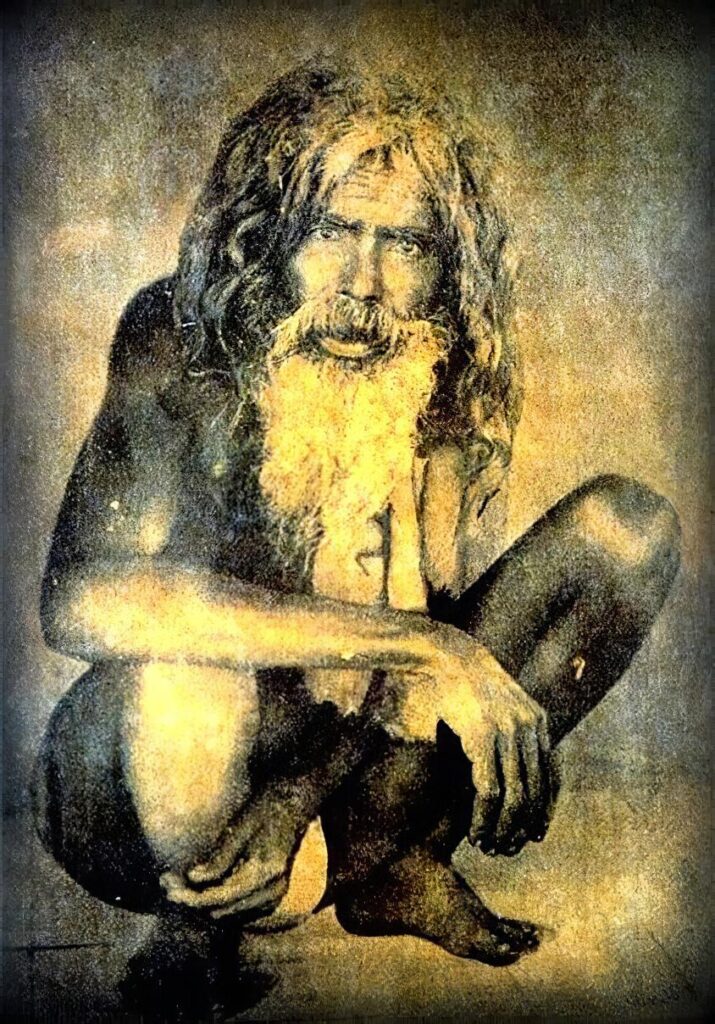At the time of Bhaktivinoda Thakura, there were three great Vaishnavas who lived as humble babajis: Srila Jagannatha Dasa Babaji (the siksa guru of Srila Bhaktivinoda Thakura), Srila Gaurakishora Dasa Babaji (who later became the diksa and siksa guru of Srila Bhaktisiddhanta Sarasvati Thakura) and Srila Vansi Dasa Babaji.
Amongst the three, Vansi Dasa Babaji is the most difficult to understand in terms of behavior. He was absorbed in a paternal rasa with his deities and would often chastise them, just like one may chastise his own children when they misbehave. He was also completely averse to ordinary social interactions, avoiding attention as much as possible and behaving in ways ordinary people could not understand or appreciate. Bhaktisiddhanta Sarasvati Thakura was advising his disciples to not come close to him, in order to avoid committing offenses to such an exalted soul. Instead, he was instructing them to offer obeisances at a distance and leave offerings close to his door, so he could use them when appropriate without getting disturbed by the presence of uninvited guests.
He lived as a total recluse in a solitary place close to Ganga in the region of Navadvipa, behaving like a crazy person. He lived in his world, centered around his deities. As possessions, he had just a pair of kaupinas (loincloth) and a kantha (the patchwork blanket used by renouncers) for himself, and a pair of brass pots and a few other items for serving his deities.

Much of the behavior of Vansi Dasa Babaji is just incomprehensible to us. It’s just the behavior of someone maddened by the nectar of love for Krsna. However, there is an aspect I feel can be useful for deepening our understanding of the world and finding our way out of it, which is the way he referred to himself.
Normally, when we speak about something we do, or something we are we use the word “I”, which may refer to the body, the mind, the intelligence, or some other concept of identity based on the false ego. Vansi Dasa Babaji, however, used to refer to himself in the third person, “Vansi Dasa”. He would say things like “Vansi Dasa spoke that” or “Vansi Dasa was there”. This was not a figure of speech, he was intentionally using the third person. Instead of identifying himself with his material identity, he was fully fixed on his spiritual identity and saw his outward dress as something separate from himself, a material manifestation he could observe from the outside.
As a concept, this is quite profound. What we call “jiva” is actually a combination of the soul and the subtle body, composed of false ego, mind, and intelligence, which is in turn covered by the gross body. This is one of the reasons it is sometimes said that the jiva was never outside the material world: the soul came from outside, but the combination of the soul and the ego, mind, and intelligence was formed here and therefore was nowhere else. When one finally goes back to Godhead, this combination is dismantled, and the now pure soul goes back to his original position in the spiritual world.
It’s relatively easy to understand that we are not the gross body, and someone who is a little more advanced may understand that the material intelligence is just a tool we use to solve problems connected with this world and also not part of our real self. However, the identification with the mind and the different layers of the false ego usually goes very deep.
When a lady says that a man is “interested in me, not in my body”, the word “me” means the mind. When someone writes an article or book, the “me” refers to the intelligence, and so on. This combination of mind, intelligence, and ego creates many layers of identification that are difficult to break.
We may not be able to be like Vansi Dasa Babaji, but if we can start observing the activities of the mind from a little far, without identifying with it, it can save us from many problems. When we start observing the workings of the mind from the outside, we become less affected by it. The mind may desire this or that, but I’m a separate being, and I may desire something else. The mind may kick and screen, but still, I understand that it’s my choice to follow or not it’s dictation.
Only a pure soul can see himself fully as the soul, and observe from afar the the workings of the body, mind, and intelligence, understanding that these are separate things. The behavior of Vansi Dasa Babaji gives some insight into how this process of desidentification works.
For most of us, it is naturally impossible to behave in the same way, becoming entirely disconnected from the material reality as he was. We still need to keep some practical relationship with this world to operate inside of it as students, householders, or spiritual teachers and fulfill our duties. However, we can still practice it internally, learning to break away from the identification with the mind, while at the same time externally performing our duties.
